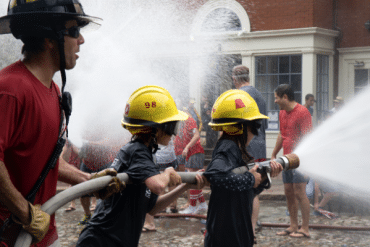With in-person galas canceled and their doors temporarily shuttered, Nantucket’s nonprofits are reinventing themselves this season.
Nantucket is home to over a hundred nonprofits, the majority of which depend on annual summer galas and events to keep their doors open, pay their staff and maintain their important stitch in the rich cultural fabric of the island. Every Monday since the coronavirus pandemic struck, a contingent of the island’s nonprofit leaders has met virtually to strategize about the summer season. With each grappling with the dual challenge of providing their services while also fundraising in a vastly different set of circumstances, these executive directors have been collaborating more closely than ever before.
 “Believe me,” said Joe Hale, the executive director of the Dreamland who has helped quarterback this nonprofit think-tank, “Nantucket’s nonprofit community is busy brainstorming some of the most innovative and creative solutions to meeting the challenges presented by the pandemic.” The Dreamland is a fitting example of that. As a cultural arts center and theater that is unable to admit moviegoers for the foreseeable future, the Dreamland was quick to pivot by planning a drive-in theater. Five days after Hale and his team launched a GoFundMe to build the Dreamland Drive-In, enthusiastic donors exceeded their target goal by giving more than $150,000. At press time, the Dreamland Drive-In was being constructed in the fields on 7 Nobadeer Farm Road where it was slated to host its annual gala on July 16th. Hale and his team were also exploring the possibility of creating an outdoor cocktail lounge on their Harborview Terrace where people could safely enjoy a drink on the Dreamland’s second-story deck overlooking the water.
“Believe me,” said Joe Hale, the executive director of the Dreamland who has helped quarterback this nonprofit think-tank, “Nantucket’s nonprofit community is busy brainstorming some of the most innovative and creative solutions to meeting the challenges presented by the pandemic.” The Dreamland is a fitting example of that. As a cultural arts center and theater that is unable to admit moviegoers for the foreseeable future, the Dreamland was quick to pivot by planning a drive-in theater. Five days after Hale and his team launched a GoFundMe to build the Dreamland Drive-In, enthusiastic donors exceeded their target goal by giving more than $150,000. At press time, the Dreamland Drive-In was being constructed in the fields on 7 Nobadeer Farm Road where it was slated to host its annual gala on July 16th. Hale and his team were also exploring the possibility of creating an outdoor cocktail lounge on their Harborview Terrace where people could safely enjoy a drink on the Dreamland’s second-story deck overlooking the water.
 Other island institutions also acted quickly to reimagine how their patrons could still enjoy their offerings while maintaining strict social distancing requirements. “The Whaling Museum is installing a yellow ‘Cobblestone’ Road à la The Wizard of Oz,” described James Russell, the executive director of the Nantucket Historical Association. “The visitor can walk this ‘road,’ enter all the galleries, including the roof deck, without touching anything.” Instead of in-person guides, the NHA has created new audio and video tours for visitors to follow along as they walk the Cobblestone Road. “New exhibitions abound,” said Russell, “and a brand-new Discovery Center designed for kids will definitely make you want to tap your heels three times and say there is no place like the NHA.”
Other island institutions also acted quickly to reimagine how their patrons could still enjoy their offerings while maintaining strict social distancing requirements. “The Whaling Museum is installing a yellow ‘Cobblestone’ Road à la The Wizard of Oz,” described James Russell, the executive director of the Nantucket Historical Association. “The visitor can walk this ‘road,’ enter all the galleries, including the roof deck, without touching anything.” Instead of in-person guides, the NHA has created new audio and video tours for visitors to follow along as they walk the Cobblestone Road. “New exhibitions abound,” said Russell, “and a brand-new Discovery Center designed for kids will definitely make you want to tap your heels three times and say there is no place like the NHA.”
Each of these visits to the Whaling Museum will now be scheduled and timed, with guests booking their slots in advance online. Morning appointments will be reserved for the elderly while evening hours will be allotted exclusively for NHA members. The museum has also upgraded its HVAC system and installed multiple sanitation stations. Beyond the Whaling Museum, the NHA’s historic sites will include what Russell described as “old-fashioned ‘bullhorn’ lectures, plays, performances and games.” As for its major annual fundraiser, Nantucket by Design, the NHA will host the event online beginning July 30th.
 Meanwhile, the Egan Maritime Institute’s Shipwreck & Lifesaving Museum has turned to other digital mediums to stay connected with their supporters and share the wealth of their historical resources. This spring, Egan launched a podcast called Time & Tide, hosted by Egan’s manager of maritime education Evan Schwanfelder, that teaches listeners about the dramatic shipwrecks and high seas rescues of Nantucket’s past. “We have all become more tech savvy and have had to reinvent how we share our stories,” said Pauline Proch, Egan’s executive director. “In addition to the podcast, we also released a virtual tour of the museum accessible through the Lingar app available for Android and iPhone.” The Boston-based Lingar app enables patrons to point their phones at items in the museum, which then prompts text, audio, video and other forms of augmented reality to pop up on their screens. While Egan will have to wait until their physical doors reopen to realize the full potential of this sophisticated technology, guests can now use the Lingar app to enjoy virtual tours of the museum.
Meanwhile, the Egan Maritime Institute’s Shipwreck & Lifesaving Museum has turned to other digital mediums to stay connected with their supporters and share the wealth of their historical resources. This spring, Egan launched a podcast called Time & Tide, hosted by Egan’s manager of maritime education Evan Schwanfelder, that teaches listeners about the dramatic shipwrecks and high seas rescues of Nantucket’s past. “We have all become more tech savvy and have had to reinvent how we share our stories,” said Pauline Proch, Egan’s executive director. “In addition to the podcast, we also released a virtual tour of the museum accessible through the Lingar app available for Android and iPhone.” The Boston-based Lingar app enables patrons to point their phones at items in the museum, which then prompts text, audio, video and other forms of augmented reality to pop up on their screens. While Egan will have to wait until their physical doors reopen to realize the full potential of this sophisticated technology, guests can now use the Lingar app to enjoy virtual tours of the museum.
The Theatre Workshop of Nantucket (TWN) has also taken this all-virtual approach to their theatrical productions. As the coronavirus descended on the country, TWN was in the midst of their staged reading series. “We continued with the remainder of our series online live via Zoom,” said TWN’s managing director Bethany Oliver. “We also created our first-ever virtual production number called ‘On With the Show,’ in which forty actors of all ages who have worked with us over the years came together from Nantucket, New York, Los Angeles and points in between to create this virtual message of hope for the future of live theater.”
 Not only have these virtual performances enabled TWN to enlist actors from places as remote as Idaho, they’ve also reached viewers who would not normally file into the seats at Bennett Hall. “Our audience has come from even further afield with people tuning in from Europe, South America and as far away as New Zealand,” said Oliver. “They’re all coming together even though we are apart to be part of something authentic and live.” On July 26th, TWN will broadcast a live telethon variety show on NCTV titled “On With the Show: A Spotlight on the Future” in an effort to boost financial support for this sixty-four- year-old island institution.
Not only have these virtual performances enabled TWN to enlist actors from places as remote as Idaho, they’ve also reached viewers who would not normally file into the seats at Bennett Hall. “Our audience has come from even further afield with people tuning in from Europe, South America and as far away as New Zealand,” said Oliver. “They’re all coming together even though we are apart to be part of something authentic and live.” On July 26th, TWN will broadcast a live telethon variety show on NCTV titled “On With the Show: A Spotlight on the Future” in an effort to boost financial support for this sixty-four- year-old island institution.
The White Heron Theatre has taken a similar cue by moving their educational classes online. What is being billed as the Broadway Master Class, White Heron’s Student Company will follow the direction of some top Broadway stars. Taking the lead role as director is Jen Waldman, who has appeared in nearly thirty shows on Broadway.
The Jen Waldman acting studio is one of the most highly regarded in New York City and will now be accessible on Nantucket virtually. Students will learn how to prepare for auditions and how to write original songs. The classes will culminate in the White Heron’s Cyber-Cabaret showcased online this summer.
Using this all-virtual approach has proven instrumental for other educational nonprofits like the Nantucket Book Foundation, which quickly made their annual book festival entirely virtual early on in the pandemic. With the help of former CNN senior executive producer Michael Schulder, the Book Festival launched a series of highly produced At Home With Authors presentations. “Almost all of our 2020 author lineup has agreed to participate, and the response so far has been incredibly gratifying,” said Maddie Hjulstrom, the foundation’s executive director. “Our analytics show viewers as far away as India and China.”
Most recently, the Book Festival distilled its hour-long interviews into Tiny Takes, what Schulder described as “entertaining and perspective-changing excerpts—in two minutes or less.” Despite these new, enlightening virtual offerings, Hjulstrom admitted that there was a deep sense of disappointment in having to cancel their popular in-person festival.
 Canceling events presents one of the biggest challenges to the nonprofit community. “Our summer gala raises almost half of our annual operating budget each year, so canceling the event was a tough decision,” said Jessica Sosebee, the executive director of NiSHA, which has seen an uptick in pet adoption amid the pandemic. “NiSHA relies on donations and grants to operate, so reinventing our development plan for 2020 has been the most challenging. We need to be available every day of the year in case there is an animal in need at our door.” This summer, instead of their wildly popular UnLeashed pet fashion show, NiSHA will host a livestream event on July 31st featuring interviews with pet parents and other forms of digital entertainment.
Canceling events presents one of the biggest challenges to the nonprofit community. “Our summer gala raises almost half of our annual operating budget each year, so canceling the event was a tough decision,” said Jessica Sosebee, the executive director of NiSHA, which has seen an uptick in pet adoption amid the pandemic. “NiSHA relies on donations and grants to operate, so reinventing our development plan for 2020 has been the most challenging. We need to be available every day of the year in case there is an animal in need at our door.” This summer, instead of their wildly popular UnLeashed pet fashion show, NiSHA will host a livestream event on July 31st featuring interviews with pet parents and other forms of digital entertainment.
Among the many lessons that the pandemic has illuminated in the nonprofit community, the vital role of health and human service providers has been undeniable. Non-profits like the Food, Fuel, and Rental Assistance Program, A Safe Place, Fairwinds, Alliance for Substance Abuse Prevention, Meals on Wheels and, most obviously, the Nantucket Cottage Hospital have been operating at full-tilt to meet the critical needs of the community emerging every day.
 “We at A Safe Place have received increased reports of domestic violence incidents in particular and have seen a small increase in the number of people that we are serving already,” said executive director Jennifer Frazee, who has been on-call with her team twenty-four hours a day throughout the pandemic. “We anticipate this number increasing significantly as our community reopens, and survivors and their children are able to have their voices heard again.”
“We at A Safe Place have received increased reports of domestic violence incidents in particular and have seen a small increase in the number of people that we are serving already,” said executive director Jennifer Frazee, who has been on-call with her team twenty-four hours a day throughout the pandemic. “We anticipate this number increasing significantly as our community reopens, and survivors and their children are able to have their voices heard again.”
As these health and human service providers serve the well-being of islanders, the cultural arts nonprofits support the way of life that so many have come to love on Nantucket. “The economic vitality of Nantucket is ultimately at stake here,” concluded Joe Hale. “You could argue that the arts—along with hospitality—are the economic drivers for Nantucket. I’m not saying the arts are more important than health care or education or civic engagement, but they’re an important leg to the table that supports society.”








